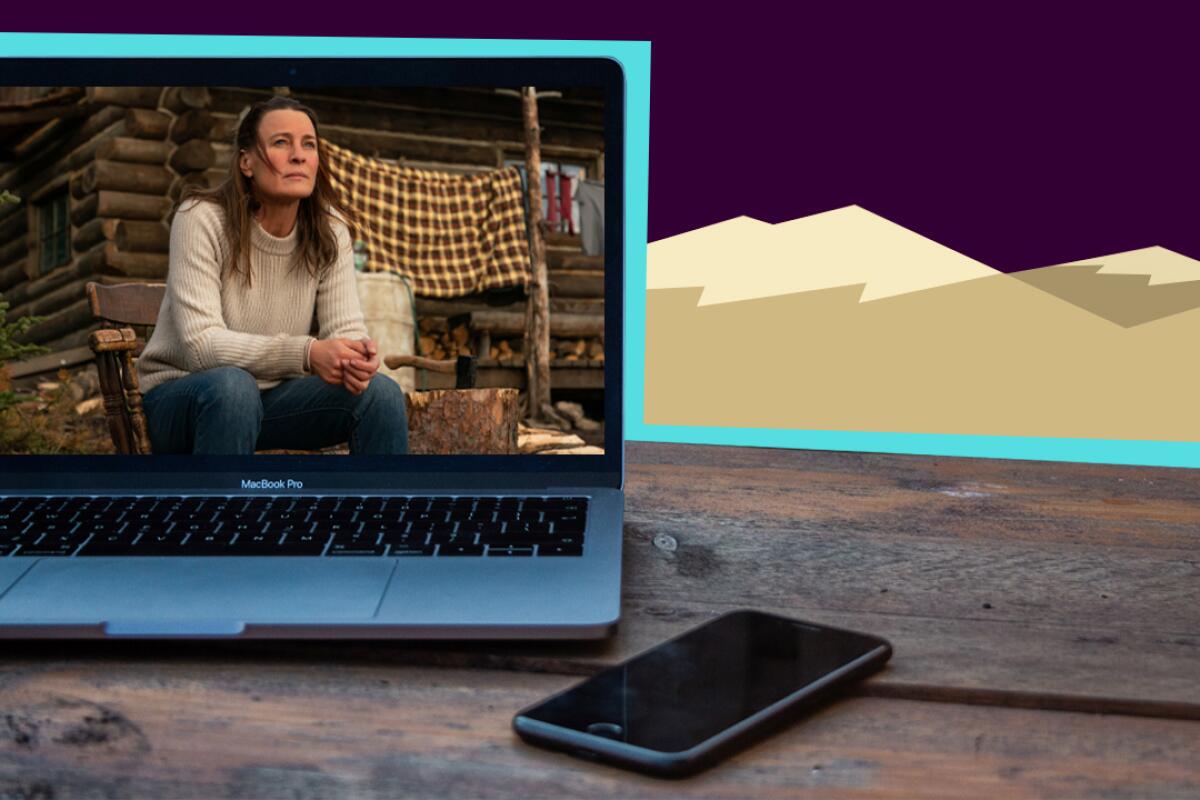The Wide Shot: Will a virtual Sundance produce real deals?

Any good sales agent in the movie business will tell you that the Sundance Film Festival is the event that sets the tone for the year to come. And in many ways, that may be all too true for 2021 as the online version of the beloved festival kicks off Thursday.
Inside the business of entertainment
The Wide Shot brings you news, analysis and insights on everything from streaming wars to production — and what it all means for the future.
You may occasionally receive promotional content from the Los Angeles Times.
Absent is the high-altitude hype driven by festival-goers chatting in line before the screenings, sharing notes over beers, and haggling over deal terms in and around Park City, Utah. No standing ovations to drive up prices this year. Instead, distribution executives, agents and filmmakers will have to resort to scouring Twitter for reactions and firing off texts to one another after the movies screen (or, in reality, after they stream).
The market itself will be dramatically different. Some 70 films will screen at this year’s mostly digital festival, down from the more than 120 that played in 2020, meaning far fewer movies are seeking distribution.
Several factors will complicate deal-making, which is already a fraught process as buyers try to guess whether the movie they’re bidding for is this year’s “Palm Springs” (a pandemic-friendly hit for Hulu, which co-acquired it with Neon in 2020) or “Blinded By the Light” (which bombed for Warner Bros. in 2019). This year’s lineup includes films by high-profile names including Rebecca Hall, Edgar Wright and Jerrod Carmichael.
The uncertainty surrounding the fate of theaters looms large. Without the ability to guarantee a robust theatrical rollout, the traditional indie studios won’t have one of their trustiest advantages over streaming companies. That could become a challenge as companies like Sony Pictures Classics go up against the direct-to-consumer services that have been perfectly willing to make big bets at virtual festivals like TIFF, where Netflix reportedly paid $30 million for “Malcolm & Marie” and $20 million for Halle Berry’s “Bruised.”
Indie studios tend to offer big sums for films when they think there’s a chance that the movie they want can make a major splash in theaters, like a “Little Miss Sunshine” or “Brooklyn.” The calculations have changed over the years to include streaming revenues. But studios are still hoping that by late summer or early fall, theaters will be more open than they are now.
With no guarantee of the arthouse-friendly markets of Los Angeles and New York loosening their cinema restrictions, distributors may be less willing to plunk down the kinds of eight-figure offers that can compete with Netflix, Amazon and other streamers that need movies for their platforms.
On the flip side, if theaters are more widely open when Oscar-thirsty titles tend to thrive, those studios are going to need product. And the cupboards are pretty bare right now as the pandemic has delayed production. With fewer films available this time, supply and demand says we should expect buyers to write some big checks.
Digital services will also need an infusion of new films to keep audiences interested, so expect them to be in the mix, along with the theatrically inclined distributors with close ties to direct-to-consumer platforms (Searchlight with sister streaming outlet Hulu; A24 with Apple TV+).
“It’s a cautious optimism for us, but we’re optimistic that it’s going to be a real market, particularly for companies whose business is reliant on the theatrical experience,” UTA Independent Film Group agent Mikey Schwartz-Wright told me.
I’ll dig deeper into the state of the virtual market later this week, but if Schwartz-Wright is correct, it would be a welcome morale booster for a business sorely in need of something to celebrate.
Eye on CBS TV Stations

For the last two years, my colleague Meg James, who covers corporate media for The Times, has been reporting on the fraught workplace culture of CBS Television Stations after the sexual misconduct scandal and the resulting ouster of Leslie Moonves. Her months-long investigation culminated in a blockbuster pair of stories that ran over the weekend.
One of the pieces detailed allegations of abusive and racist treatment of employees within the local TV stations division, which people who spoke to James said were not taken seriously enough by investigators tasked with conducting a thorough review of the workplace environment at the broader media company.
In one of the most startling allegations, a former general manager recalled CBS TV Stations head Peter Dunn referring to a Black Philadelphia news anchor as “just a jive guy.” Dunn declined to comment. CBS said it previously looked into the allegations against Dunn and that it is “committed to ensuring an inclusive and respectful work environment for all its employees.”
The National Assn. of Black Journalists responded, saying it met with CBS officials Sunday to discuss the allegations in the story and called for Dunn and another executive, David Friend, to be fired. ViacomCBS suspended Dunn and Friend Monday night, saying in a statement that the two had been “placed on administrative leave, pending the results of a third-party investigation into issues that include those raised in a recent Los Angeles Times report.”
James’ other piece examined an unusual 2011 deal in which CBS bought a Long Island TV station for $55 million and received a membership to a prestigious golf club as a sweetener from the seller, station founder Michael Pascucci. Dunn, in whose name the membership was held, used the membership as a “personal perk,” the story said.
CBS said the membership was disclosed and was used to entertain clients and business partners.
According to James’ reporting, the golf course membership and the toxic work environment issues were flagged for independent law firms hired to investigate CBS’ workplace culture.
“What our reporting showed was real shortcomings of the high-profile internal investigation of Leslie Moonves in 2018,” James told me Monday. “What we found was that, when they were presented with serious allegations about managers at the TV stations, they did investigate it internally, but it became unclear what they did with the information.”
AMC’s lifeline
Metro-Goldwyn-Mayer Studios’ decision to yet again delay “No Time to Die,” as unsurprising as it was, set off a fresh round of questions about how movie theaters will stay in business with no new films, a slower-than-expected vaccine rollout and anemic attendance. Multiple other movies shifted release plans, including “A Quiet Place Part II” and “Cinderella,” leaving the movie schedule thin once again.
Yet defying the odds was AMC Theatres, the world’s largest cinema operator, with Monday’s early morning announcement that it had raised $917 million in equity and debt financing to stay out of bankruptcy court in the coming months as the industry waits for the situation to improve.
“Clearly this is a great day for AMC,” Chief Executive Adam Aron told me Monday with characteristic confidence.
The company, owned by China’s Dalian Wanda Group, isn’t quite home free and will come out of the crisis a heavily leveraged company. Still, anyone who’s spoken to Aron, or even read the recent New York Times’ profile, knows his shoot-from-the-hip style belies a level of shrewdness that has allowed the company to outlast doubters’ expectations.
Aron told me the company does not plan to sell off additional locations after unloading nine theaters in Latvia, Lithuania and Estonia. Meanwhile, the company is in the midst of what Aron described as “an intense dialogue about the Warner Bros-AMC relationship going forward” after the AT&T-owned studio’s decision to move its entire 2021 slate to an experimental day-and-date streaming strategy.
Number of the week

That’s the combined executive compensation packages for Disney’s top two executives — CEO Bob Chapek and Executive Chairman Bob Iger. It’s less than Iger made by himself in 2019.
Iger earned about $21 million in fiscal 2020, a total that included no bonus in a year that put severe pressure on the Mouse House’s finances. Chapek’s tally was $14.2 million, which also included a zeroed-out cash bonus and reduced salary. Bloomberg notes Chapek’s haul is “one of the lowest compensation levels for a Disney CEO in more than a decade.”
No one is saying that the heads of Disney will be struggling to scrape by without their big paydays, especially with thousands of parks workers (many of whom were part-time and hourly) and other employees out of work. Still, it’s worth noting that Iger’s pay package shrank 56% from fiscal 2019 and nearly 70% from 2018 as Disney’s bottom line was clobbered.
Will we see similar cuts for rival media company chiefs as more of their employers release their proxy statements in the spring?
C-suites in media and entertainment have consistently been among the most handsomely rewarded in corporate America. ViacomCBS CEO Bob Bakish is eligible for $31.5 million in executive compensation for his first year at the helm of the combined company, with a target bonus of $12.4 million. AT&T boss John Stankey made $22.5 million in 2019, when he was still just president and chief operating officer. Discovery’s David Zaslav nabbed $46 million in fiscal 2019, down from a mind-blowing $129 million the prior year.
On the calendar
— WarnerMedia parent AT&T reports earnings Wednesday morning.
— Comcast Corp. reports earnings Thursday.
— Sundance Film Festival, Thursday through Feb. 3.
Future of Debt-flix

Netflix’s 203-million subscriber number is a big deal, no doubt, as some analysts worry about churn, saturation and competition. What astute financial observers latched onto was this line from the company’s investor letter, laid out in bold: “We believe we no longer have a need to raise external financing for our day-to-day operations.”
So no more new borrowing for Netflix, which has debt-financed its way to the level of film and TV production values that have turned “Bridgerton” into the what must be among the most expensive bodice-rippers of all time. Netflix’s cash-burning tendencies have been a longtime focus for Wall Street’s Netflix skeptics. Now the company says it will consider rewarding shareholders with buybacks.
More top stories
— WWE is headed to Peacock. WSJ’s Joe Flint reports that World Wrestling Entertainment content will stream exclusively on the NBCUniversal-owned network starting in March in a deal worth more than $1 billion.
— If Walmart and Amazon are offering to help Biden with the vaccine rollout, “why not Hollywood crews?” asks Anousha Sakoui in her story on IATSE’s offer to the new administration. Speaking of production, FilmLA’s Paul Audley gave a Q&A on the state of the return to on-location filming in a pandemic.
— Tre’vell Anderson profiled Michele Ghee, who has been tapped to revive the pioneering Black publications Ebony and Jet for a new era. The challenges are significant, Anderson writes: “As the broader media industry experienced its shifts, Ebony and Jet, and similar outlets deemed ‘niche,’ struggled.”
— Jack Ma, co-founder of China’s Alibaba Group, resurfaced after speculation about his whereabouts. (WSJ.)
— This deep dive on the women who took on Burger Records, one of the biggest indie music stories of the last year, is definitely worth a read. Jessica Gelt reports.
Finally ... getting in ‘the zone’
Pixar’s “Soul” wouldn’t have worked without a brilliant soundtrack, including the jazz piano contributions of Jon Batiste. During those moments when the main character gets lost “in the zone” while playing, I thought of Keith Jarrett. The pianist’s improvised solo piano concert recordings, including the transcendent “Köln Concert” album, are undeniably good starting points. His more straightforward standards collections, which a musician friend recently turned me on to, are also lovely. This New York Times profile from October, which depicts the musician as coming to terms with two strokes he suffered in 2018, is essential reading on the jazz master.
Inside the business of entertainment
The Wide Shot brings you news, analysis and insights on everything from streaming wars to production — and what it all means for the future.
You may occasionally receive promotional content from the Los Angeles Times.




